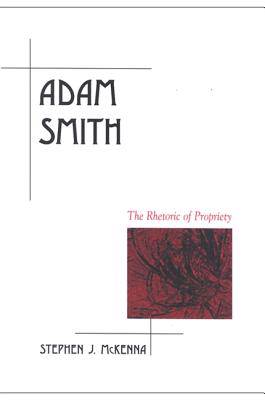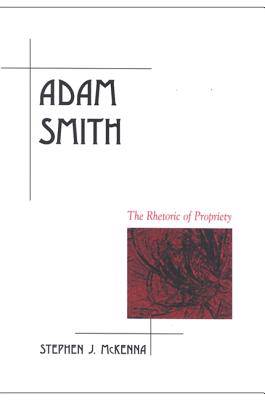
Door een staking bij bpost kan je online bestelling op dit moment iets langer onderweg zijn dan voorzien. Dringend iets nodig? Onze winkels ontvangen jou met open armen!
- Afhalen na 1 uur in een winkel met voorraad
- Gratis thuislevering in België vanaf € 30
- Ruim aanbod met 7 miljoen producten
Door een staking bij bpost kan je online bestelling op dit moment iets langer onderweg zijn dan voorzien. Dringend iets nodig? Onze winkels ontvangen jou met open armen!
- Afhalen na 1 uur in een winkel met voorraad
- Gratis thuislevering in België vanaf € 30
- Ruim aanbod met 7 miljoen producten
Zoeken
Omschrijving
Before his famed career as moral philosopher and economist, Adam Smith (1723-1790) was well known for a series of public lectures on rhetoric that he gave in Edinburgh and Glasgow. In this volume, Stephen J. McKenna provides the first book-length treatment of Smith's rhetorical theory, focusing on his theory of rhetorical propriety--the means by which effective communication is adapted to the variables of subject, audience, speaker or writer, purpose, and moment--and the centrality of this concept to his thought. McKenna shows that Smith's contribution to the theory of rhetorical propriety offers insights into the interdisciplinarity of rhetoric, particularly its relation to ethics, and has practical implications for the ways we conceive of and conduct rhetorical discourse and education today.
Specificaties
Betrokkenen
- Auteur(s):
- Uitgeverij:
Inhoud
- Aantal bladzijden:
- 200
- Taal:
- Engels
- Reeks:
Eigenschappen
- Productcode (EAN):
- 9780791465813
- Verschijningsdatum:
- 5/01/2006
- Uitvoering:
- Hardcover
- Formaat:
- Genaaid
- Afmetingen:
- 162 mm x 231 mm
- Gewicht:
- 381 g

Alleen bij Standaard Boekhandel
+ 111 punten op je klantenkaart van Standaard Boekhandel
Beoordelingen
We publiceren alleen reviews die voldoen aan de voorwaarden voor reviews. Bekijk onze voorwaarden voor reviews.











